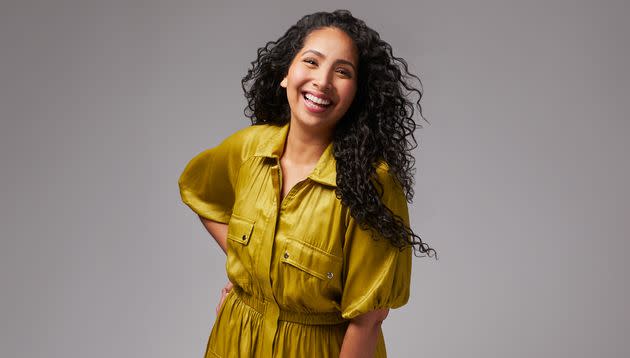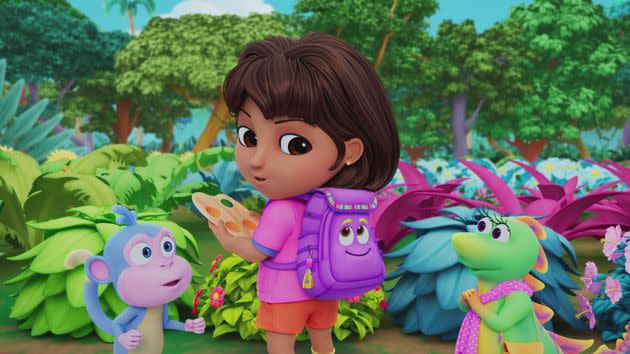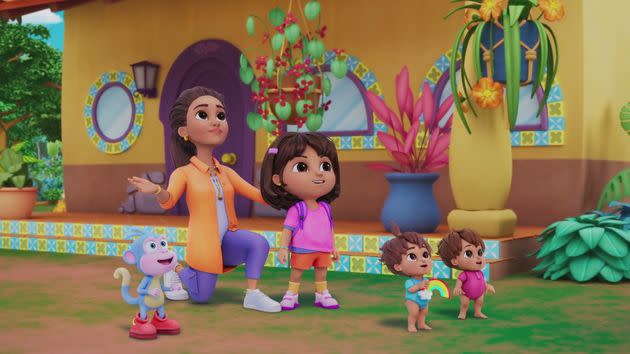Dora The Explorer Is Returning To TV — And The Iconic Voice Of A Generation Is All Grown Up
- Oops!Something went wrong.Please try again later.
- Oops!Something went wrong.Please try again later.

For over a decade, Kathleen Herles voiced one of the most iconic kids characters in history: Dora Márquez aka Dora the Explorer.
She was cast at the age of 7 and worked on the pilot for over a year. Initially, the show wasn’t picked up, and Herles was 10 years old by the time it premiered in August 2000. “Dora the Explorer” aired for eight seasons until August 2019 and featured the title character with her backpack and best friend Boots as they completed epic adventures.
A first-generation Peruvian American, Herles says voice acting was a huge learning experience for her and her parents, who emigrated from Peru in their late teens. While Herles had an inkling that the show might be a success, she never could have predicted the generation-wide impact she’d have on kids her age.
“I’m like the best babysitter of all time,” Herles jokes during our virtual interview.
Dora’s impact and the global success of the show can’t be ignored. Paramount+ is ready to introduce Dora to a new young audience, with its revival series, “Dora,” which premieres on Friday. Diana Zermeno is the new voice of Dora. Herles voices Dora’s mother, Mami, in a full-circle moment. She notes that there will be tons of differences in the upcoming reboot, but also tons of similarities.
“I think people who are my age, who grew up with [Dora] will still feel that sense of nostalgia, but it will also be something that this new generation will also connect with,” she says. “And the new voice of Dora, I remember when I first heard her, literal tears came to my eyes. I know she’s going to lead this new generation to what they need.”
To say the show changed Herles’ life is an understatement. She went from a full-time elementary student to recording lines for a TV show, toys, video games, and more.
So how did a 7-year-old come up with the voice that would define a generation? It turns out that was just how Herles sounded when she was younger. Nowadays her voice is a little deeper, but she easily slips into the voice of Dora with its unique high-pitch inflections and playful candor.
While she remembers being directed in the booth as a child, Herles says she tried to just have fun with it.

“You don’t put a lot of pressure on yourself when you’re a kid. You can play and you can make very natural decisions in your acting. I think that’s what’s really special about a child actor. You just feel a little more free,” Herles says. She tries to maintain this youthfulness as she pursues voice acting full-time after quitting her job as an interior designer last June.
“I want to make sure I don’t lose that playfulness — that’s what makes animation fun for everyone,” she said.
Beyond making a show that resonated with children and allowed them to learn more about a different culture and language, Dora was a historic turning point for kids entertainment. Not only was it almost revolutionary to have a Latina that openly speaks Spanish as the main character on a children’s TV show, but Herles was one of the few Latinas in the industry paving the way for other voice actors of color. As of 2021, only 16.5% of voice actors identify as Hispanic or Latino, and with women making up only 29.2% of the total voice acting world, that makes Latina voices an even rarer phenomenon, especially in the early 2000s.
During her time on the series, Herles says there was still a lot of stigma surrounding what a Latino should sound like. She remembers many people expecting to hear an accent or wanting her to feign an accent to seem more Latino. While this may seem like a minute detail for non-Latinos, it’s an incredibly dividing topic within our own communities. There’s stigma for those without accents because you’re not considered Latin enough, and there’s stigma for those with accents because you don’t sound American enough.
Herles says this was an issue in her own household. She was taught English first so that she’d have a more neutral accent and not encounter any comprehension issues in school — something her older brother struggled with.
Growing up, Herles struggled with wondering if she was Latina enough because her Spanish wasn’t perfect, and she didn’t have an accent like her brother or parents. Despite her own questions regarding her identity, Herles says it’s vital to not be type-casted as a Latina voice actor.
“I think even today it’s kind of hard for me to understand what the expectation is from me because I don’t see myself any less Latina or any less Peruvian because my Spanish isn’t perfect or has a specific accent attached to it,” she says. “We’re all different. I’m still Latina and nothing can take that away from me. This is where I come from and no matter how I speak, how I act, that’s never going to change. And that’s me.”

Beyond finding her own voice through Dora, Herles believes Dora paved the way for children’s programming and animation. She says it was not only an introduction into a new culture for many children, but a huge win for Latino representation during this time.
“I’ve heard so many times people saying [they] had no one to connect to until Dora,” she says. “I think that’s where you can see the importance of representation as a whole.”
For Herles herself, Dora was a doorway into the impossible. Her favorite episode to record was “Dora’s Fairytale Adventure” where Dora becomes a princess.
“I feel like a lot of girls dream of being a princess. For me, that was something I always loved, so when I got to do this episode, it really touched me in a different way. I didn’t know [being a princess] was possible because a lot of [them] didn’t look like me. Even as an actor, I didn’t know those were roles I could even play,” Herles says as she pulls out the toy version of Princess Dora and plays with the magically growing hair. “Dora’s bringing everybody together and keeping the door open to new experiences, to new adventures. That’s where her heart is, and it shows that’s how far she went.”
Despite having over 20 years of voice-acting experience, Herles says she still experiences imposter syndrome, even after she earned an Imagen Award nomination in 2007, and two NAACP Image Award nominations in 2007 and 2008.
She remembers being nominated in the same category as America Ferrera, Eva Longoria and Raven-Symoné, and feeling like she didn’t belong. Even now, when she’s attending conventions and waiting in the green room with other actors, she says she’ll look around and wonder if she’s meant to be there among the seasoned, beloved creatives.
“I feel like I have a community now within the industry, which I don’t think I had growing up. Having that support in the industry is really important, and I feel like that’s shaping who I am today. It makes me more confident and it pushes me to be better,” Herles says of finally feeling like she belongs in these spaces. “It’s always important to have that support and community in whatever you’re doing.”
While she says she struggled to see the impact her voice had in the past, she gets emotional thinking about Dora’s legacy now that she’s older.
“Dora will always be a part of me. She had such a big impact on my childhood and who I am, and who I was, that I don’t have to define myself without her. It makes me emotional to think about the impact, the importance [of Dora], and to be a part of something like that reminds me that my voice, as little as I may think it is, sometimes it’s a lot bigger.”
